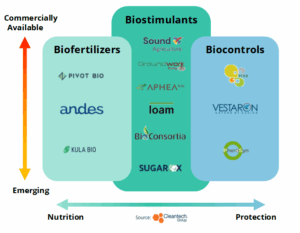The world’s meals provide is approaching a vital threshold. With the necessity to almost double crop output by 2050 and environmental pressures tightening, farmers want options that enhance yields however don’t come at the price of soil and water well being, biodiversity, or already-razor-thin revenue margins.
One promising reply to those challenges is biostimulants.
Sitting someplace in between crop vitamin merchandise (equivalent to fertilizers) and crop safety merchandise (like pesticides), biostimulants provide among the advantages of each these classes, whereas working another way.
Whereas fertilizers ship vitamins to the plant, and pesticides assault pests and ailments, biostimulants work straight on the plant’s personal physiology, enhancing pure organic processes within the plant itself and the soil it grows in to spice up stress tolerance, enhance nutrient uptake, and enhance yields.
Biostimulants have been round for a while, in a single kind or one other. However there’s now a resurgence in curiosity, because of advances in innovation, regulatory tailwinds, and the urgency to supply extra meals, extra sustainably.
What Are Biostimulants?
Biostimulants comprise a broad number of inputs which can be utilized to seeds, foliage, or soil to boost crop yield and stress tolerance by modulating organic and physiological processes.
Whereas they’re distinct from fertilizers and pesticides, they’re usually complementary to them.
This flexibility signifies that biostimulants could also be bundled with fertilizers to scale back reliance on chemical compounds or used alongside pesticides as a part of crop safety packages. They will additionally play a central position in regenerative farming to enhance and keep optimum soil biology.
The Market Is Shifting Towards Biologicals
Lots of the newest biostimulant merchandise are organic, and will include microbes, plant and algae extracts, acids, or proteins.
The worldwide marketplace for organic inputs – together with biostimulants in addition to biocontrols, biopesticides, and biofertilizers – is projected to match the chemical crop inputs market by the 2040s pushed by:
- Local weather change adaptation and resilience (sustaining crop manufacturing amid extra frequent heatwaves, droughts, and floods; water shortage; salinity)
_ - Degrading soil well being on account of outdated land administration practices, overapplication of chemical compounds and vitamins
_ - Farm economics (the necessity for different instruments amid straining fertilizer provide chains, mounting pesticide resistance, and rising enter prices typically)
_ - Regulatory advances, notably in Brazil, the EU, and India, the place biostimulants are actually handled as a definite product class
_ - Carbon market curiosity, with some innovators (e.g., Loam Bio, Sound Agriculture) emphasizing the carbon seize capabilities of their biostimulants and constructing carbon credit platforms
Organic Crop Inputs: Discrete however Overlapping Classes
Innovation At an Inflection Level
The most recent technological advances are increasing the capabilities of biostimulants by dashing up R&D and bringing down among the prices of manufacturing:
- AI-driven screening platforms (e.g., Lavie Bio) are accelerating discovery of microbes, energetic compounds, and mechanisms of motion
_ - Precision fermentation capability is enabling scaled-up manufacturing (e.g., Ginkgo Bioworks)
_ - Upcycled feedstocks are being leveraged for biostimulant properties (e.g., Tidal Imaginative and prescient utilizing chitosan from seafood waste)
Incumbents In Acquisition Mode
Established agrochemical and agribusiness gamers are additionally leaning into the biostimulants pattern as they acknowledge the necessity to complement their reliance on typical chemistries.
As regulatory stress on chemical compounds intensifies and farmers search alternate options, biostimulants provide a method to lengthen agrochemical product portfolios and cut back danger profiles.
Mosaic acquired biologicals innovator Plant Response, remodeling it into its in-house biologicals enterprise. Fellow fertilizer large ICL has made a number of acquisitions and strategic bets on AI-powered discovery. Syngenta has inked a variety of partnerships to distribute third-party biostimulant merchandise and produce extra AI capabilities on board; it additionally acquired biostimulant firm Valagro to increase its product portfolio.
Challenges Stay
Regardless of all this rising curiosity, biostimulants as a class nonetheless lack the popularity of fertilizers and pesticides. Farmer consciousness stays low, on the entire; whereas biostimulants are nonetheless perceived as being ‘nice-to-have’ fairly than requirements. Then there’s the complicated problem of regulation, with biostimulants handled as both fertilizers or pesticides in lots of components of the world, or not acknowledged in any respect.
Within the U.S., biostimulants are at the moment regulated at a state stage with important variation between jurisdictions, complicating nationwide go-to-market methods.
Alternatively, key agricultural producers like Brazil, India, and the EU have more and more acknowledged biostimulants as a definite class lately, providing extra regulatory readability for innovators.
Ultimate Take
As increasingly more knowledge is collected from area trials and finest practices are borne out, regulatory clearances and farmer adoption are more likely to enhance.
At this stage, innovators ought to concentrate on scientific and area validation, and forging sensible partnerships with incumbents, co-ops, and different organizations that may assist them navigate business and regulatory landscapes.
Biostimulants are not any silver bullet; however they don’t have to be. As climate-related shocks change into extra extreme and stress builds to supply meals ever extra effectively, biostimulants can ease our means on that journey, working in tandem with fertilizers, pesticides, and sensible farm administration.




